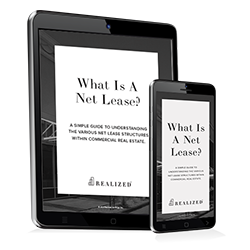Page 3 21 - 30 of 98
Medical and Healthcare Properties: Unique Aspects of NNN Lease Investments

Investing in triple net (NNN) properties offers plenty of benefits, such as stable income and hands-off involvement. Beyond the obvious advantages of this lease structure, however, you can also enjoy benefits from the specific type of NNN property you acquire.
Impact of Inflation on Triple Net Lease Investments

As you may already know, triple net (NNN) investments are promising real estate structures that offer stable income and hands-off involvement for investors. However, like any other investment instrument, NNN leases are not immune to certain economic conditions. For example, inflation can have an impact on triple net lease investments for better or worse.
Leveraging Debt in Triple Net Lease Investments: The Risks and Rewards

Entering into a triple net (NNN) lease structure holds a lot of promise, but financing is often necessary given how these properties require substantial capital upfront. Debt can be a powerful tool if you’re able to leverage it with the right strategy, but financing can also introduce risks that may undermine the stability of the NNN property.
Cash Flow Management in a Triple Net Lease Investment

Investing in a triple net lease (NNN) property has become a popular strategy for various types of investors, offering steady and predictable income for the long term. While this structure does provide reliable returns, there are still lots of variables. Cash flow management, therefore, is a critical consideration in triple net lease investing.
Triple Net Lease Valuation: How To Determine If You’re Getting a Fair Price

Triple net (NNN) leases are reliable on paper, offering steady income and passive involvement for investors or landlords, plus letting tenants handle the net operating expenses reduces your exposure to market volatility. However, like any other real estate investment, the true value goes beyond surface-level numbers.
How To Evaluate If a Triple Net Lease Investment Is Right for You

Triple net leases, also referred to as NNN leases, are a promising type of investment that allow you to earn income with minimal landlord responsibilities. As you pass all net operating expenses to the tenant with this kind of lease, you also limit exposure to market volatility and get to enjoy hands-off involvement. However, these same features may be considered drawbacks for certain types of investors. Given these considerations, it’s essential to ask if a triple net lease investment is right for you.
Breaking Down Tenant and Landlord Responsibilities in a Triple Net Lease

Triple net (NNN) leases provide a clear-cut way to divide financial responsibility between tenant and landlord or property owner. If you’re an investor, you may find this structure appealing. There’s a promise of hands-off involvement on your end, resulting in passive income. But are you truly free from any responsibility, or are there other costs that NNN leases don’t cover? What are the specific responsibilities for tenants and landlords in this type of lease?
Single, Double, and Triple Net Leases: Understanding Key Differences

When it comes to commercial real estate investing, one of the most important aspects to understand is lease structures. As a concept, leasing may seem straightforward — your tenant occupies your asset and pays rental income. However, there are many kinds of leases out there, and some divide the expenses between the tenant and the landlord. These structures are called net leases.
Why Investors Choose Triple Net Leases: Key Benefits and Risks

Triple net leases, otherwise called NNN leases, have been gaining popularity over the past few years due to the benefits these structures offer, especially for commercial property investments.
Triple Net Lease Brokers: Tips For Finding A Broker

Successfully transitioning your investment property to Triple Net Lease (NNN) properties—whether through direct ownership or a 1031 exchange—requires selecting a broker that aligns with your goals.
Page 3 21 - 30 of 98


